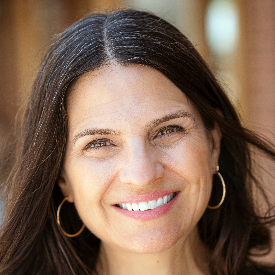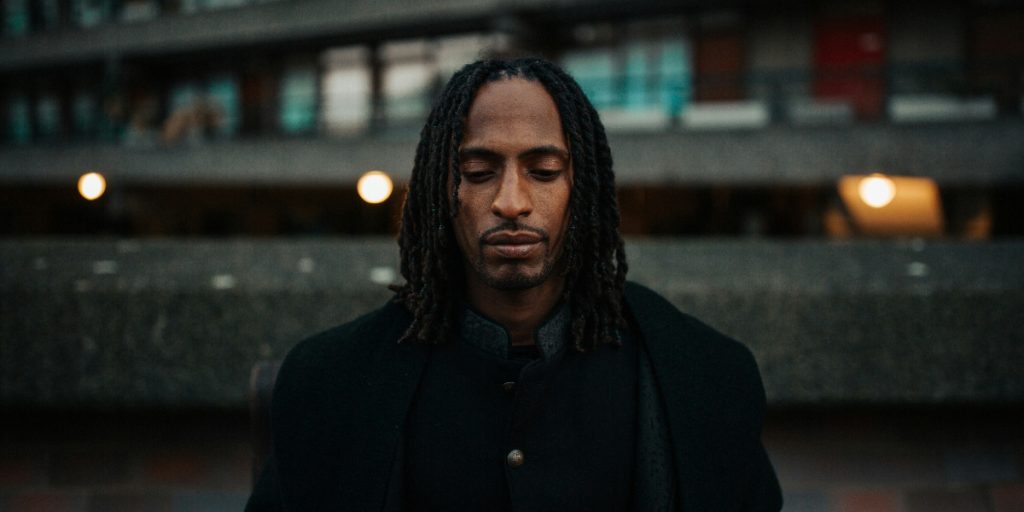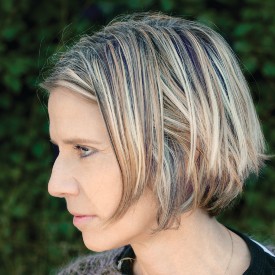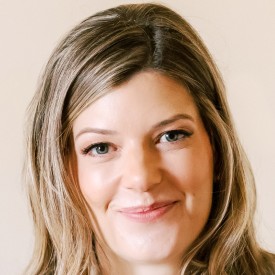Sharon Brous is senior and founding rabbi of IKAR, a Jewish congregation in Los Angeles.
Below, Sharon shares five key insights from her new book, The Amen Effect: Ancient Wisdom to Mend Our Broken Hearts and World. Listen to the audio version—read by Sharon herself—in the Next Big Idea App.
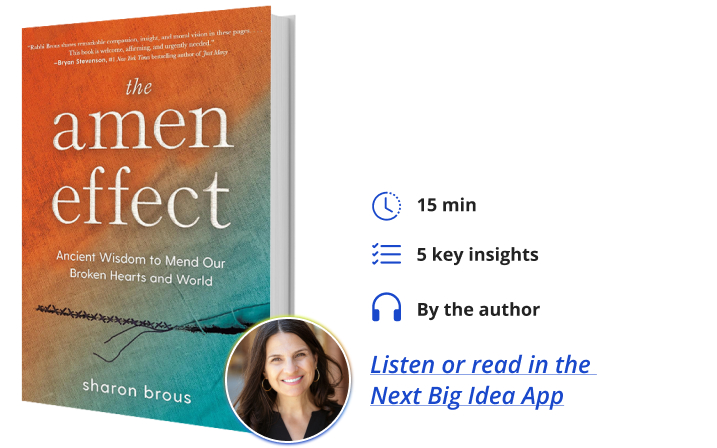
1. Loneliness and social alienation pose a great threat to health, safety, and wellbeing.
We are living through an era marked by loneliness, social alienation, and isolation—a condition only exacerbated by COVID—and it’s breaking our spirits, hurting our bodies, and threatening our democracy.
Loneliness is more an inner state than an external reality. It’s about feeling alone, not necessarily being alone. It impacts all of us: single and partnered, young and old, urban, suburban, and rural. Loneliness is so dangerous that it is now considered a public health crisis, both in the U.S. and around the world. This crisis has reached epidemic proportions.
It is hurting our spirits—causing disconnection, despondency, and despair. It is hurting our bodies—acute loneliness has the physical impact of smoking 15 cigarettes a day. And it is threatening democracies. As Hannah Arendt, the great 20th-century philosopher, argued, widespread social alienation is a precondition for the flourishing of violent political extremism. “Terror can rule absolutely only over men who are isolated against each other… Therefore, one of the primary concerns of all tyrannical governments is to bring this isolation about. Isolation may be the beginning of terror; it certainly is its most fertile ground; it always is its result.”
For Arendt, isolation is impotence. The more limited our meaningful contact with one another, the more we cannot act together toward the common good, let alone to respond effectively to great dangers. Alone and apart, we are powerless. It is a matter of the greatest urgency that we address our instinct to retreat from one another with a reinvigorated commitment to step toward one another instead.
2. We are biologically, psychologically, and spiritually hardwired for connection.
My grandma Millie had a rule: you show up for the celebration. She framed her rule like this: if you would fly in for the funeral, you better find a way to make it there for the wedding. My grandma lived to 98, and my grandfather to 90. I attribute their longevity to the fact that they went dancing every night, never turned down a Dewar’s on the rocks before dinner, and they embodied, to the very end, this rule. They showed up. Life is precarious, but you are alive.
Some years ago, my mentor lost his mother. One of my mentor’s superpowers is that everyone who’s ever met him feels that they are his closest friend. So, when his mother died, I imagined him suffocating under the weight of a thousand well-intentioned best friends overwhelming him with lasagna and lingering hugs. I wrote a sweet note. I did not fly in for the funeral, and to my shame, I didn’t even pick up the phone. When I saw him a few months later, he castigated me: “I don’t want excuses,” he said. “I needed you, and you were not there. Next time, show up.” It was at this point that I amended my grandma’s rule: you show up for the celebration and you show up for the funeral. Err on the side of presence.
“Seeing one another in celebration, sorrow, and solidarity along the way is essential to well-being.”
Biologists, neurologists, psychologists, and clergy attest to the same fundamental truth: human beings need connection. Connection gives our lives meaning and purpose. From a spiritual standpoint, we are meant to live dialogically. The gift God gave humanity from the start—according to the Hebrew Bible—was the gift of one another. We have a profound human need to be seen as we truly are, which makes social connection a necessity. Relationships are core to our being. Seeing one another in celebration, sorrow, and solidarity along the way is essential to well-being.
There are many barriers to honest, heartfelt presence and connection. Chief among them is the faulty notion that we must not just be present with one another but must fix one another. Instead, as one of my dear congregants, a bereaved father, shared with me after his son’s death: what people in anguish need, more than anything else, is with-ness. “We don’t need people to fix us,” he told me. “We need not to be abandoned. We need people willing to sit with us in the pain.”
Our task as friends and community is not to repair broken hearts. Our job isn’t to heal or save, distract or cheer up. We need just to show up, be present, and engage in the holy work of sacred accompaniment.
3. Our hearts are capacious enough to hold sorrow and celebration.
Several years ago, one of the families in our community went away for a short end-of-summer vacation, and their beautiful little boy, Gidi, was killed in a terrible boating accident. It was days before his fifth birthday. This was a child who introduced himself to strangers in line at the ice cream shop and greeted every teacher by name as he galloped into school each morning, exuberant. His death made a mockery of the world. A trauma tore through our community.
That first night after Gidi’s funeral, his family told me that they were planning on coming to Shabbat services so that they could say the mourner’s prayer. The problem was that for that particular Shabbat, we were also planning to celebrate the bar mitzvah of a wondrous child. This boy embraced and delighted in every moment of his preparation and learning, and he deserved a wholehearted celebration.
We must remember that celebration is a spiritual necessity. Joy is intended to be both experienced and shared. Sometimes, when we experience something wonderful, it doesn’t even feel real until we share it with someone else. We have a biological need to share our joy. Research shows that sharing our joy may be even more impactful than experiencing it in the first place. We have the natural capacity to be energized and inspired by someone else’s dream fulfilled, even when our own hearts are aching.
“We must grieve deeply with hearts that contain multitudes.”
But how would we mourn Gidi and celebrate the bar mitzvah? How do we dance and sing in the presence of so much pain? I wondered if the walls of the room—and our hearts—would simply collapse. But they did not. We lifted the bar mitzvah boy high in a chair and threw candy and shouted blessings at him, even as the bereaved family stood, shattered, just a few feet away. We wept, and we danced.
Rather than mute joy in the face of loss, we must embrace it fully. As human beings, we need not avoid, minimize, or compartmentalize grief. We must grieve deeply with hearts that contain multitudes. In this way, we honor the complex beauty of the human condition. We affirm how spacious, capacious, and profoundly interconnected we are.
4. We often find our life’s purpose not in searching for it, but in serving others.
My friend, Erin, was a young mother when her life was interrupted by a stage four breast cancer diagnosis. Despite her fierce will to live and the unyielding love of her husband, children, and many friends, the cancer rapidly progressed. In the final months of her life, Erin spent time at a cancer retreat center where she wrote the following:
What is your soul calling you to do? What is the mission, the meaning, only you can fulfill? Where have you hidden away your most profound desires and aspirations? Can you unearth them? Most importantly, how are you actively thwarting their accomplishment? We so assiduously sabotage the very thing that would bring us the most satisfaction.
Erin seemed determined to leave us with an enduring message: our life’s work is to discern our core purpose, hear the call, and then do everything we can to live it, for whatever time we have. I hear in her words that something is expected of us.
Identifying and living our purpose is a spiritual imperative of the highest order. Each of us was brought into this world with some higher purpose. What does this moment demand of me? How am I uniquely able, whether by circumstance or through the cultivation of gifts and abilities, to meet this moment? Our life’s work is to hold the spiritual and moral clarity to live by our unique purpose. We step into our purpose by refusing to look away from one another. We must see each other, both in beauty and in brokenness. We are meant to be of service to one another. Showing up for another person alters the psychological landscape of our hearts—because tender presence is a direct line to the heart.
Our faith traditions bear this out. One Spanish Rabbi of the 13th century wrote that one of the most crucial things a person is called to do in life is exert himself to the full depths of his very soul on behalf of another person. His near contemporary, Saint Francis of Assisi, wrote that our highest mission as human beings is to be of service to one another: “It would be considered a theft on our part if we didn’t give to someone in greater need than we are.”
5. We are suffering from a dangerous curiosity deficit.
Just as a lonely person can become a sick person, in body and spirit, a society of lonely, atomized, socially disconnected people will become a sick society, one susceptible to extremist ideologies and powerless to resist dangerous social and political upheaval.
For decades, we’ve witnessed a mushrooming of social alienation and disconnectedness. Nearly a third of Americans today report that they do not know their next-door neighbors, and an astonishing 20 percent of Americans report that they have no close personal relationships at all. That number has more than doubled in the last decade. This level of isolation is concerning and dangerous.
This crisis of disconnection is exacerbated by tribalization. Human beings are hardwired for connection, but we are also tribal by nature, meaning we instinctively look to build and reinforce relationships with people we perceive to be like us. Tribal attachments can be meaningful and beneficial; a sense of belonging can be a source of strength and purpose. The tribal mindset leads us to fight mightily for those we see as part of our tribe.
“Nearly a third of Americans today report that they do not know their next-door neighbors, and an astonishing 20 percent of Americans report that they have no close personal relationships at all.”
But there is a dangerous side to this instinct. Ironically, the stronger the bonds of connection to those in our group, the weaker our bonds to those outside the group, leaving us indifferent or even hostile toward those not in our tribe.
Curiosity is the birthplace of compassion, but the greater the psychological distance between us, the less curious we are about one another. When we don’t wonder what the other is thinking or feeling or where their pain comes from, our hearts close. This leaves us less understanding of other perspectives and more entrenched in our dogmas and narratives. A society devoid of empathy is at great risk of falling into patterns of dehumanization that have, throughout history, led to the most extreme acts of violence.
Extremist movements are already testing the limits of our democracies, and all indicators are that this will only worsen unless we find the appetite for a dramatic course correction. It is precisely now—when our instinct is to recoil from one another—that the need for an ethos of sensitive, sincere encounter is vital and urgent.
When we turn to one another with openhearted curiosity, it is often we who benefit because by affirming another person’s humanity, we reinvigorate our own. There are precious moments when the seeds sown in the field of wonder flourish into something unexpected and truly wonderful in the world. Human understanding is no substitute for accountability or systemic change, but it might be the prerequisite to those righteous outcomes. Sacred recognition of each other’s humanity may be the best and most enduring way to mend our broken hearts and world.
To listen to the audio version read by author Sharon Brous, download the Next Big Idea App today:













